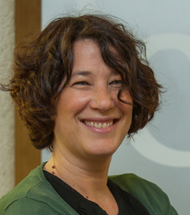“Interreligious dialogue is one of the most important aspects of building a pluralistic and fully developed society”
Carolina Aisen, the director of the Spanish Federation of Jewish Communities, participated as a speaker at the “Sefarad: A living legacy” conference, organized by the ICS

FOTO: Manuel Castells
“Interreligious dialogue is one of the most important aspects of building a pluralistic and fully developed society," or so argued Carolina Aisen, the director of the Spanish Federation of Jewish Communities (FCJE). She participated as a speaker at the “Sefarad: A living legacy” conference, organized by the Institute for Culture and Society (ICS).
Aisen said that in Spain, interreligious dialogue between the Abrahamic religions –Judaism, Islam and Christianity- exists. “Although these different faiths have found areas in which to reflect and collaborate, the work of the Pluralism and Coexistence Foundation has also helped significantly. In this regard, these spaces for dialogue must develop not just at the inter-institutional level, but also within each faith’s different levels and sectors,” she noted.
On the other hand, she emphasized the importance of education, “not just as formal studies in school, which is of course important, but also as the learning process itself”. According to her opinion, “we need to learn about and understand the other, including their beliefs, customs, and particularities. Understanding the other will help normalize the inclusion not only of the different faiths, but also of a plural Spanish society”.
With regard to the topic of the conference, she stated that “the Sephardic legacy teaches us that, in the past, several communities with different traditions and customs lived here in a certain harmony”. She noted that contemporary Spanish society “is heir to that past, although it is not always known or internalized. It is therefore important that society as a whole know and learn from its own history”.
Jewish population in Spain: 40,000 peopleThe director of the FCJE mentioned that currently, the Jewish population in Spain consists of forty thousand people, with its own institutions, schools, and educational and social centers. “Although small in number, the Jewish community is alive and well in twenty-first century Spain. It is going through the same problems and changes that Spanish society experiences in general. It is a pluralistic community from all points of view and is perfectly integrated into Spanish society”.
Aisen indicated that some of the challenges faced by the Jewish community in Spain and in Europe today are the public examinations on Jewish calendar holidays; the religious assistance and the food served in public centers such as hospitals, prisons and military barracks; the opening of religious spaces and having parcels inside municipal cemeteries for Jewish burials, according to their tradition that requires some religious specificities.
Carolina Aisen also referred to the resurgence of anti-Semitism in Spain and Europe. “Hate crimes have increased markedly in recent years in both Spain and Europe, and anti-Semitism and Nazi apologists are part of everyday life,” she deplored. She stressed that the reform of the Penal Code last year “is thus very important to highlight in that it provides a powerful tool for prosecuting anti-Semitic discourse and hate crimes”. She also pointed out that the FCJE also runs the Observatory of Anti-Semitism in Spain and produces an annual report highlighting the events that occurred during the previous year.
